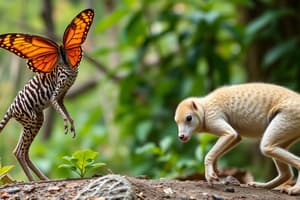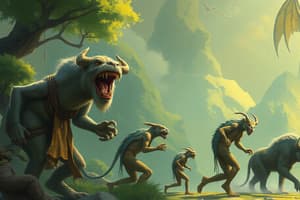Podcast
Questions and Answers
What is the primary determinant of fitness in Darwin's theory of evolution?
What is the primary determinant of fitness in Darwin's theory of evolution?
- Physical strength or health
- Ability to adapt to the environment
- Reproductive success (correct)
- Longevity
How does the concept of 'variation' relate to natural selection?
How does the concept of 'variation' relate to natural selection?
- Variation is a direct result of natural selection
- Variation is the process by which organisms become fit
- Variation refers to the differences between individuals within a population, which is the basis for natural selection (correct)
- Variation is the measure of reproductive success
What is a common criticism of the phrase 'survival of the fittest'?
What is a common criticism of the phrase 'survival of the fittest'?
- It does not take into account the non-random nature of survival and reproduction
- It is not clear enough
- It is too closely related to other concepts in evolutionary theory
- It suggests a circular argument (correct)
How does the process of adaptation relate to the concept of fitness?
How does the process of adaptation relate to the concept of fitness?
What is the main difference between the concepts of individual survival and reproductive success?
What is the main difference between the concepts of individual survival and reproductive success?
Study Notes
Natural Selection: The Process of Adaptation and Survival of the Fittest
Natural selection is a fundamental concept in the theory of evolution, which explains how species change and adapt over time to their environments. It is based on the idea that certain traits or characteristics are more beneficial for an organism's survival and reproduction in a given environment. The two main subtopics of natural selection are adaptation and survival of the fittest, which are closely related concepts.
Adaptation
Adaptation refers to the process by which species become better suited to their environment through the inheritance of traits that enhance their ability to survive and reproduce. This process is driven by natural selection, as individuals with traits that provide a survival or reproductive advantage are more likely to pass these traits on to their offspring. Over time, these beneficial traits become more common within a population, leading to the evolution of new species.
For example, consider a population of fish living in a river with a rapidly changing temperature. Some fish have a genetic trait that allows them to tolerate a wider range of temperatures, while others are less tolerant. Over time, the fish with the wider temperature tolerance are more likely to survive and reproduce, passing on their genes for temperature tolerance to their offspring. Eventually, this trait becomes more common in the population, and the fish are better adapted to their environment.
Survival of the Fittest
The phrase "survival of the fittest" was coined by Herbert Spencer, who borrowed it from Charles Darwin. It suggests that the individuals best suited to their environment are the most successful in surviving and reproducing. The term "fit" here refers to an organism's ability to survive and reproduce in the context of its environment. It is a measure of reproductive success, not necessarily physical fitness.
In Darwin's theory, the fittest individuals are those that produce the most offspring, not necessarily those that are the strongest or healthiest. This is because the traits that lead to reproductive success are not necessarily the same as those that lead to individual survival. For example, a bird with a bright plumage may be more likely to attract a mate and produce offspring, even if it is less able to fly or hide from predators.
Interactions with Other Concepts
Natural selection is closely related to other concepts in evolutionary theory, such as variation, reproduction, and heritability. Variation refers to the differences between individuals within a population, while reproduction and heritability are the mechanisms by which these traits are passed down from one generation to the next. Together, these concepts form the basis of Darwin's theory of evolution by natural selection.
Criticisms and Misunderstandings
The phrase "survival of the fittest" has been criticized for being misleading or tautological. Some argue that it suggests a circular argument, as it seems to say that the fittest survive because they are fit, and those that survive are fit. However, the modern understanding of fitness as a measure of reproductive success takes into account the non-random nature of survival and reproduction in the context of an organism's environment.
Conclusion
Natural selection is a powerful concept that explains how species adapt to their environments through the effects of genetic variation on survival and reproduction. The related concepts of adaptation and survival of the fittest are fundamental to our understanding of how species evolve over time. By understanding these concepts and their interactions, we can gain a deeper appreciation for the complex processes that shape the natural world around us.
Studying That Suits You
Use AI to generate personalized quizzes and flashcards to suit your learning preferences.
Description
Explore the core concepts of natural selection, including adaptation and survival of the fittest, in the context of evolutionary theory. Learn how species evolve over time through genetic variation, reproduction, and the inheritance of traits that enhance survival and reproduction.




